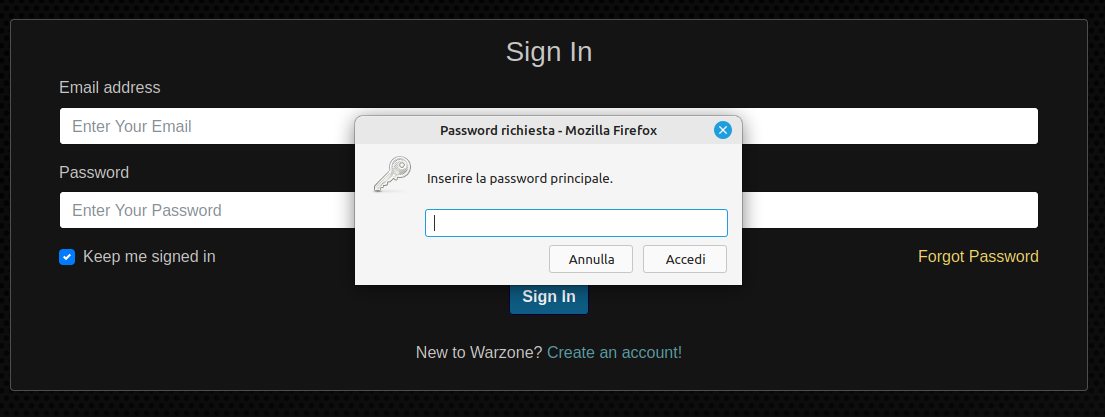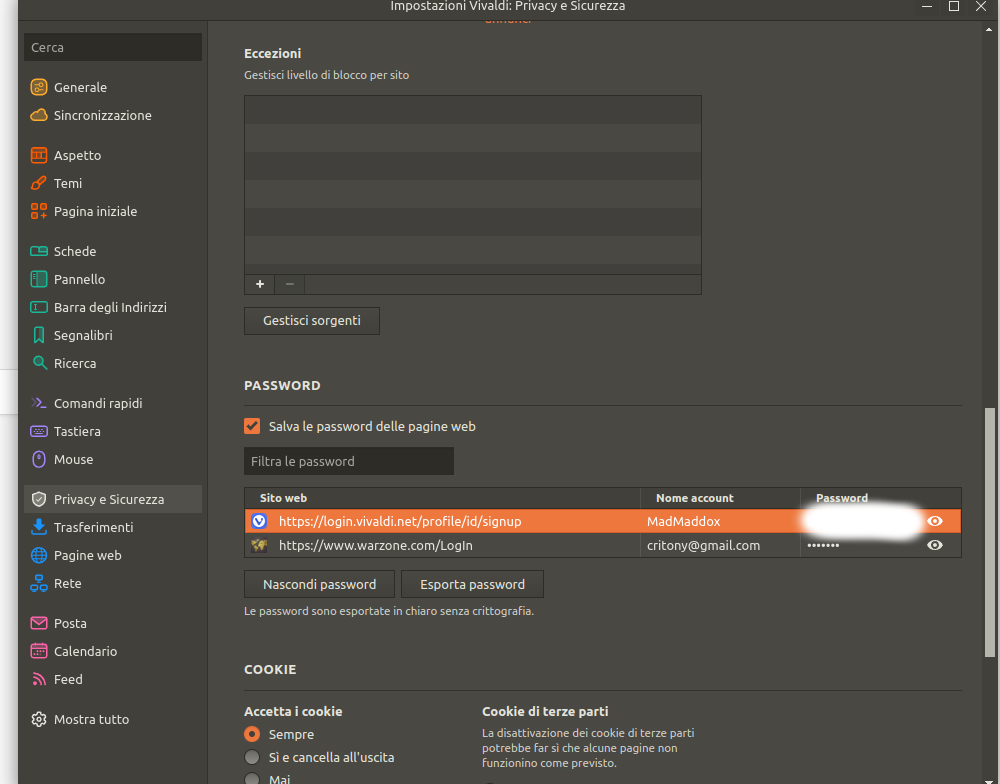Master Password Protected Mode to Protect your Profile
-
@idlewild This is a very old feature request with close to 200 upvotes, making it the fifth most popular feature request. However, there is no ETA, so I recommend finding another method of protecting your privacy on a shared computer.
I have my own way of protecting my data: I install Vivaldi on a VeraCrypt drive, so that it should be safe even if someone steals my PC and can bypass the user account password.
Not only your browsing data, but many other documents on your PC may need to be hidden from your children, or from co-workers.
-
why ?
...is this still not implemented ??

A huge security flaw... Especially browser contain all the passwords

-
@lockrol said in Master Password Protected Mode to Protect your Profile:
why ?
...is this still not implemented ??I just noticed this post is tagged as WILL NOT DO.
So I guess it never will be... -
@pauloaguia said in Master Password Protected Mode to Protect your Profile:
tagged as WILL NOT DO.
So I guess I never will be...Yes, the feature request i found in bug tracker was closed, they will not add it. May be consume too much human power and time for small team or something lese. I do not know.
May be chat with a dev explains:Passwords are encrypted using an OS-login-specific encryption key, only usable when you have logged into the OS.
Anyone with physical access to the login session, or is able to install malware on your computer would be able to work around such extra passwords. -
Chrome does not have a real profile protection either. Everyone with basic computer skills or at least users with admin rights can read out a huge amount of data out of the user profile folder (History, bookmarks, extension data).
I have the feeling that both the Chrome and the Vivaldi developers don't want to have the hassle to deal with all those hackers who would love to try to reverse the protection.
Veracrypt, at least on Windows, etc. is no solution as one cannot install it without admin rights (which I don't have and would not get at work).
So the only solution would be a portable install and then kill the sensible data in "User data" every time you leave your PC (or disconnect your profile and re-connect it every time).
Sad but true...
-
This post is deleted! -
What is the current workaround to save passwords securely in Vivaldi? Is there a recommended password management plugin?
Or is this another reason to switch back to Firefox as the default development browser?
-
Hi,
Look at Passwords sectionhttps://forum.vivaldi.net/topic/51704/guide-v-backup-extra-steps
-
@Zalex108 said in Master Password Protected Mode to Protect your Profile:
@ingo-steinke
Hi,
Look at Passwords section
https://forum.vivaldi.net/topic/51704/guide-v-backThanks! That's very helpful, both for sticking to Vivaldi and maybe also for migrating back to Firefox.
-
This will help for any Browser / OS / Device.
-
Would this work for some of you? Simply 7-Zip your Default profile, or sensitive subfolders within it if you want to make the process faster, with password protection. Then delete the profile. Before you open Vivaldi next time, restore the profile.
I've cut a short video on it. I'm using Linux with the KDE desktop, and everything is built into the context menu. The voice on the video isn't too clear.
-
@awking This is an essential feature for protecting passwords at rest.
The Chromium Dev team rationalizes this as duplicative effort because the Windows O/S already protects the user account, and the password store is encrypted on disk by the Windows login crypt.
However, this does not protect passwords stored on disk from trojans and viruses, because they can also access the same Windows API for decrypting the password store on disk.
Adding a "master password" as an encryption key or to "salt" the Windows crypt storage prevents trojans and viruses from decrypting the passwords stored on disk.
This is difficult to do downstream of Chromium because it requires adding new code that has to be maintained to override the Chromium code. But it can be done, and in my view would be a significant distinctive to set Vivaldi apart from all the other Chromium-browser derivatives.
-
@mopani You should have replied to DoctorG, not the OP.
This request is tagged as WILL NOT DO so look for other solutions.
@DoctorG said in Master Password Protected Mode to Protect your Profile:
@pauloaguia said in Master Password Protected Mode to Protect your Profile:
tagged as WILL NOT DO.
So I guess I never will be...Yes, the feature request i found in bug tracker was closed, they will not add it. May be consume too much human power and time for small team or something lese. I do not know.
May be chat with a dev explains:Passwords are encrypted using an OS-login-specific encryption key, only usable when you have logged into the OS.
Anyone with physical access to the login session, or is able to install malware on your computer would be able to work around such extra passwords. -
@mopani said in Master Password Protected Mode to Protect your Profile:
However, this does not protect passwords stored on disk from trojans and viruses, because they can also access the same Windows API for decrypting the password store on disk.
Master Password Protection? If you have a virus/trojan/malware on your PC, it can record keystrokes, means it gets your Master password.
A master password protects you only against colleagues, your children, freiends or partners spying on you or doing other bad things on your PC. -
OffTopic: I guess a better protection would be a hardware token (Smartcard, Nitrokey, Yubikey etc.) and a PIN to unlock sensible data on browsers. But that would be an other feature request and discussion not applicable in this thread.
-
@Pesala Thanks for the correction.
-
@DoctorG That is sound reasoning and I agree that in that light a master password adds little and adds a false sense of security. Thanks.
-
Hello, first of all I wanted to congratulate the Vivaldi team for producing the most beautiful browser ever. It is possible to implement additional security in the password manager as, for example, in Firefox.

Without this "super password" it is impossible to view the PWD saved in the browser.
Vivaldi:

-
@MadMaddox If I am not mistaken, one already has to enter one’s Windows log-on password when viewing passwords for the first time.
I do not use one, as I have other ways to protect sensitive data (I use a VeraCrypt drive and install Vivaldi as a Standalone version on that).
-
@Pesala
Hello Pesala, I just tried and asked nothing, once i clicked saved sited (with saved pwd) i joined directly.
